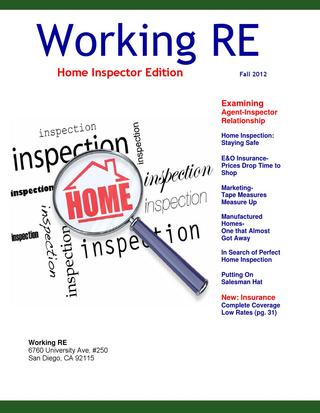
|
Home Inspectors Edition | Circulation 22,000 | Advertise | Subscribe | |
Published by OREP, E&O Insurance Experts | October 2012 |

|
>
Click to Print
>
Approved Continuing Education at Discount |
A complaint can ruin your whole day, and
most of your night. And there's nothing we can do about it, or is there?
>>>If you haven't already, take a look at Working
RE's new
Home Inspector Edition.
Editor’
Note:
First in a series of success strategies for managing risk, this story
“deconstructs” complaints and explains how your expectations play
an important role in how you handle complaints. Future topics include
how to avoid complaints, how to resolve them if they occur, how to
perform a revisit properly and how to “receive” a complaint for the best
outcome. The series provides you solutions for handling claims
successfully by examining each step of the process.
Successful Risk Management Strategies
Part One: Understanding Complaints
By Alan Carson, Carson Dunlop & Associates Ltd.
The
phone call always starts like this: “You inspected the house we bought six
months ago and now we are having problems…..”
Most of us have received calls like this, and all of us dread them. A
complaint can ruin your whole day, and most of your night. And there’s
nothing we can do about it, or is there? Let’s look at one of home
inspectors’ least favorite topics – complaints.
It is appropriate for this topic to start with a disclaimer. Writing technical articles is easy. There is research that can be done, and technical issues are anchored in physics and building science. Writing about complaints is more challenging. There is little authoritative material and we are dealing with the art of human relations rather than science. As a result, there are no definitive answers on the topic. Our goal here is to make you think. We encourage you to challenge everything presented in this article and to take away any of the pieces that work for you.
Your
Philosophy
Your personal and business philosophies play a role in how you handle
complaints. We find that, in general, there are three types of home
inspection professionals:
-
The hardliner – these home inspectors defend themselves against any and all complaints vigorously, never admitting any mistake.
-
The validater – these inspectors defend complaints vigorously when they feel unjustly accused, but respond if there is a valid problem with the inspection.
-
The conciliator – some inspectors try to satisfy every client and may pay to make a problem go away even though they made no mistake.
There is no right or wrong, but you should decide on your approach before you are in the midst of a complaint and emotion takes over.
Three
kinds of issues
We find that issues come in three types as well:
-
White issues – these complaints turn out not to be a problem with the home.
-
Black issues – these are issues where there is clearly a problem that the home inspector should have reported.
-
Gray issues – these are issues where it is not clear whether or not the inspector made a mistake.
We find the white and black issues are straightforward to deal with. The difficult ones are the gray issues, because the inspector and client may feel strongly and very differently about an issue. We find that about 10 percent of our complaints are white issues, 10 percent are black issues and 80 percent are gray issues. Nobody said it was easy!
(story continues below)

(story continues)
Handling complaints – Important Skill
Many people feel that resolving complaints is important because of the
financial risk. While this is true, there are other reasons why effective
complaint handling is an important skill.
An Opportunity
A complaint can be an opportunity to impress or educate a real estate agent,
to generate goodwill and to avoid bad publicity. In today’s world of social
media, bad news travels very fast indeed. A complaint is also an opportunity
to turn around a dissatisfied client, change a detractor into a supporter.
Let’s look at each of these.
Real estate agents don’t have many tools to evaluate home inspectors. Their
impressions are mostly based on your bedside manner. Your response to a
complaint is one way to enhance your reputation with agents. (We are
assuming for the moment that this is important to you!) A complaint is an
opportunity to generate goodwill with others. We had a difficult complaint
handled by the client’s attorney. The problem was subtle but serious and
there was considerable question as to whether we should have identified the
condition. The issue was settled with a small amount of responsibility
accepted by our firm.
About two months later, we were surprised to get a phone call from the client’s attorney. He called to book a home inspection and said that the reason he chose Carson Dunlop was the prompt, professional and straightforward manner with which we handled his client’s complaint. That attorney has been a source of referral business ever since.
Most of us have seen what a hostile media can do to home inspectors. A dissatisfied client can be the catalyst for devastating news coverage and public humiliation on Facebook, Twitter, etc. Complaints are also a way to build your business by improving your service. We learn something from almost every complaint, whether or not we make a mistake. The secret is to apply the learning to future work. Everyone makes mistakes. Successful people do not repeat their mistakes.
One Size Does Not Fit All
When dealing with communications and human emotions, there is one thing we
can be sure of - one approach does not work equally well with all clients.
You will need more than one strategy to be successful. We have learned this
lesson the hard way. We handled one complaint beautifully with a specific
strategy in June, but when a similar situation arose in September, the same
approach backfired, becoming a lawsuit.
Using Complaints to Build Business?
While some people say that you can’t make everybody happy, consider this.
There are several studies that suggest:
* 99 percent of clients who have a bad experience will not complain. This means that you don’t know about a problem and don’t have a chance to make it right.
* 91 percent of clients who have had a bad experience will neither use the firm again nor recommend it to others. This does not help in building your business by referral.
* The average dissatisfied customer tells ten (10) others about their unhappy experience.
* The average satisfied customer only tells two (2) others about their good experience.
* Nine out of ten clients (90%) will come back to use the firm again if the complaint is resolved to their satisfaction.
Perhaps more importantly, this same group will tell five (5) others, on average, about their good experience with the firm.
In a perverse way, you can create more positive feedback with clients who have had a problem resolved than with clients who were satisfied from the outset! We will stop short of advising you to generate complaints so you can resolve them, but this should help make you more enthusiastic about resolving them.
Other Results of Complaints
Complaints can wear you down. They are distracting and emotionally draining
for home inspectors. In addition to consuming your money, they may:
-Consume your time
-Change your attitude toward customer service
- Make you a more defensive home inspector
- Make it more difficult to get affordable insurance
- Increase your stress and reduce your satisfaction
We hope that we have convinced you of the benefits of handling complaints effectively. In future articles we will discuss avoiding complaints, receiving complaints, performing revisits and resolving complaints. The goal is to give readers suggestions for handling each of these steps of the process.
About the Author
Alan Carson is Past President of the American Society of Home Inspectors (ASHI)
and principal in Carson Dunlop, one of Canada’s largest home inspection
firms, founded in 1978. Carson Dunlop is distributors of the
ASHI@HOME training program home study,
Horizon report writing and business management system, the Home
Reference Book and Technical Reference Guide, which identifies the age
and size of HVAC equipment.
ATTENTION: You are receiving WRE Online News because you opted in at WorkingRE.com or purchased E&O insurance from OREP. WRE Online News Edition provides news-oriented content twice a month. The content for WRE Special Offer Editions is provided by paid sponsors. If you no longer wish to receive these emails from Working RE, please use the link found at the bottom of this newsletter to be removed from our mailing list.



